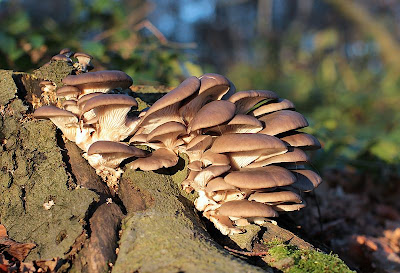by guest blogger Jody Perrecone
Jody Perrecone is a corporate manager for the Coronary Health Improvement Project (CHIP). CHIP is an international wellness program focusing on lifestyle interventions to create a healthier workforce and reduce overall healthcare costs. Jody works with hospitals, corporations, and communities to offer CHIP programs throughout the U.S.
Oyster mushrooms are a mild tasting mushroom that grows on the trunks of trees. This, along with many other mushroom varieties, have many healthy antioxidants that may help to reduce the risk of cancer, improve blood cholesterol, and boost the immune system [1].
Oyster mushrooms contain complex carbohydrates called polysaccharides that stimulate the immune system to fight cancer. They can up-regulate (turn on) the genes which stop tumors from growing and support tumor regression [2].
Eating oyster mushrooms can lower cholesterol, reduce triglycerides, and have antioxidant properties that fight oxidized LDL. Unique to the oyster mushroom is the lowering cholesterol molecule lovastatin [3], which inhibits the production of cholesterol. In a study published in the “Clinical and Experimental Pharmacology and Physiology” in 2003, rats with high and normal cholesterol were fed oyster mushrooms. Total cholesterol was reduced 28%, LDL (bad cholesterol) by 55%, triglycerides by 34% and HDL (good cholesterol) increased 21%.
Oyster mushrooms protect cells and build immunity and have antioxidant and antibacterial properties. In addition to being high in B vitamins, the calcium, phosphorus, and iron found in oyster mushrooms is nearly double the amount found in meat.
Foraging your own mushrooms can be deadly if you don’t know what you are doing. Look for mushrooms in the grocery store that are evenly colored and firm. They keep best stored in a paper bag in the refrigerator. When ready to use, wipe mushrooms clean with a damp cloth, trim the bottom of the stem, and sauté in vegetable stock. Oyster mushrooms can be included or substituted in just about any recipe that calls for mushrooms including soups, stuffings, rice or pasta dishes, or made into a tea.
Jody Perrecone is a corporate manager for the Coronary Health Improvement Project (CHIP). CHIP is an international wellness program focusing on lifestyle interventions to create a healthier workforce and reduce overall healthcare costs. Jody works with hospitals, corporations, and communities to offer CHIP programs throughout the U.S.
If you like what you see here then you'll LOVE our daily Facebook and Twitter posts! Also, don't forget to sign up for Our Free Online Mailing List to get all the latest updates from the Plant-Based Pharmacist!
Check out Dustin Rudolph's book The Empty Medicine Cabinet to start your journey towards better health. This step-by-step guide leads you through many of today's common chronic diseases (heart disease, obesity, diabetes, cancer, and more), giving you the facts on foods versus medications in treating these medical conditions. The book also contains an easy-to-follow guide on how to adopt a whole foods, plant-based diet as a part of an overall lifestyle change, producing the best possible health outcomes for you and your family. Hurry and get your copy today!
.jpg) |
| by Dustin Rudolph, PharmD Clinical Pharmacist |
Check out Dustin Rudolph's book The Empty Medicine Cabinet to start your journey towards better health. This step-by-step guide leads you through many of today's common chronic diseases (heart disease, obesity, diabetes, cancer, and more), giving you the facts on foods versus medications in treating these medical conditions. The book also contains an easy-to-follow guide on how to adopt a whole foods, plant-based diet as a part of an overall lifestyle change, producing the best possible health outcomes for you and your family. Hurry and get your copy today!
We'd love for you to join us in spreading the good word about plant-based nutrition and lifestyle medicine by telling your family and friends about our website at www.PlantBasedPharmacist.com.
Share and rate this post below or tell us what you think by posting a comment. Thank you again for stopping by and until next time... be happy, be healthy, and live the life you've always dreamed of!
Photo credit: Stu Phillips (Wikimedia Commons)
References:
1 http://www.livestrong.com/article/527913-the-health-benefits-of-king-oysyer-mushrooms
2 Gunde-Cimerman N, Friedrich J, Cimerman A, Beni Ki N. “Screening for fungi for th production of an inhibitor of HMG-CoA reductas—production of mevinolin by the fungi of the genus Pleurotus.” FEMS Microbiol Lett 1993; 111: 203-6.
3 http://www.drterrywillard.com/medicinal-mushroom-part-7-oyster-mushrooms-delicious-lipid-control/



























No comments:
Post a Comment
Note: Only a member of this blog may post a comment.